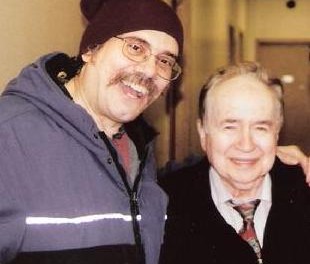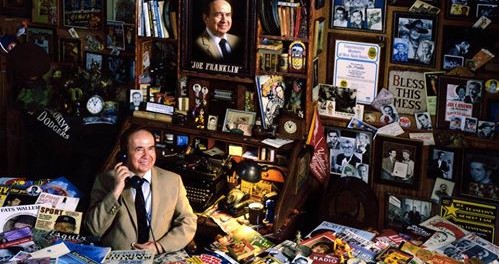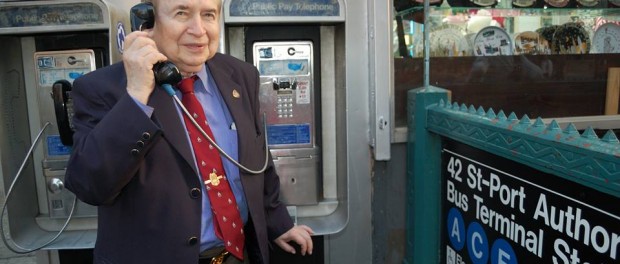RIP, JOE FRANKLIN (March 9, 1926-January 24, 2015)
He was in the Guinness Book of World Records for hosting the longest-running talk show in TV history. I was a guest on his TV show (directed by Bob Diamond) many times, sharing air time with everyone from Weird Al Yankovic (doing parodies of the latest rock songs) to Bill Challis (who'd worked with Bix Beiderbecke and Paul Whiteman, back in the 1920s).
- Chip Deffaa with Joe Franklin
- Joe Franklin with Foys
- Cohan Sings CD Cover Artwork
- Joe Franklin – Photo by David Spindel
- Joe Franklin
“I’ve had the greats, the near-greats, the has-beens, and the never-weres. Garth Brooks–I had when he was still a boot salesman in Oklahoma. ‘They Might Be Giants’–I had them when they were two kids from Brooklyn and no one else would touch them. The J. Geils Band–they had the number-one song in the country, David Letterman offered them $50,000; they said no, they wanted to do my show, because they said they wanted to talk to a real man. Who was I to argue?”
– Joe Franklin
“It’s nice to be important. It’s more important to be nice.”
–Joe Franklin
“How am I doing, Chip? Never better. Never better…. which reminds me of the time I had Sophie Tucker and Georgie Jessel on my show, and the parade was sort of passing them both by. I asked Sophie how she was doing. She said: ‘Never better, Joe. I’m weighing offers to give concerts in London, appear at the casinos in Las Vegas, and all the top supper clubs in New York are fighting over me.’ Jessel turned to her, deadpan, and said: ‘Don’t worry, Sophie; something will turn up.’”
* * *
Legendary broadcaster Joe Franklin, who died Saturday, January 24th, was one-of-a-kind. In a plastic, corporate age, he was utterly organic, utterly himself. Over the years, he had five US Presidents as guests on his show. But–showbiz to the core–he was much more proud of the fact that he had Charlie Chaplin (who never did talk shows) as a guest, and Frank Sinatra, and John Wayne, and Marilyn Monroe, and John Lennon, and Mickey Rooney (many times), and Gloria Swanson, and Bing Crosby, and Bob Hope, and Irving Berlin, and Ann Pennington, and Doris Eaton, and George M. Cohan’s widow… and oh! His idol, Eddie Cantor.
He started on radio in the 1940s, writing material for Eddie Cantor, who became his closest friend in the business. (Rudy Vallee was another close friend. He really appreciated the stars from the generation before his.) He soon was hosting a show of his own, playing records from long before his time. He made his last appearance on the radio just a week and a half ago.
He was in the Guinness Book of World Records for hosting the longest-running talk show in TV history. I was a guest on his TV show (directed by Bob Diamond) many times, sharing air time with everyone from Weird Al Yankovic (doing parodies of the latest rock songs) to Bill Challis (who’d worked with Bix Beiderbecke and Paul Whiteman, back in the 1920s). I was on his show, too, with such jazz, pop, and Broadway notables as Frank Foster, Mercer Ellington, Panama Francis, Nellie Lutcher, Joan Roberts,. Jack Walrath, Don Cherry, Gerald Marks, Ruth Gerson, Hoagy Carmichael Jr., Larry O’Keefe…. not to mention pro wrestlers, supposed psychics, health/fitness gurus, “the world’s fastest painter,” and a guy who could whistle, it seemed, through his nose… Thanks to Joe, I got to meet the Ramones and the New Kids on the Block, and all sorts of people……
He programmed the show himself, trusting his own tastes as to who he wanted to talk to, and what he wanted to talk about. (No one else in television worked that way.) He might have had nominal producers over the years, but he really called the shots. (And the one time he found himself working with a gung-ho young producer who tried to actually run things–she got into everything, doing pre-interviews with guests in the green room, trying to tell Joe what questions to ask them, and offering him unwanted “guidance” on improving the booking and pacing of the show–he quietly spoke to a boss at the station, who told her she was fired; Joe didn’t want that kind of interference from her in how he ran the show; nor did he want to fire her directly; he hated confrontations.) He was fiercely loyal to people he liked. He thought filmmaker Otto Preminger was an ideal guest, a fascinating conversationalist; he had Preminger on his show 155 times. He had George Jessel as a guest 125 times; Rudy Vallee, 85 times; Arthur Tracy (the “Street Singer” of the 1930s, who had pretty much outlived his audience), 50 times. And speed-painter Morris Katz, a whopping 800 times. Joe also knew that oddball guests could yield ratings as big as any star; so he’d play up big a visiting “dancing dentist” or the mayor who was also an impressionist. If he was a bad impressionist, so what? Audiences would love it. Director Bob Diamond always had one television camera aimed at Joe’s face, to catch Joe’s reactions, which were as essential to the show’s appeal as anything the guests did.
Joe genuinely loved all aspects of show business. Joe and I would go to shows together–on Broadway, off-Broadway, off-off-Broadway, cabaret. Walking down the street, he’d buy something from random street vendors, just to help them out. People would come up to him on the street, saying things like: “Joe! I was on your show in 1954!” (“You were terrific,” he’d assure them.) He was financially comfortable. He’d racked up as much airtime on radio and TV as anyone ever could, which meant healthy pension payments were guaranteed, he said. And yet, he’d seemingly never turn down a gig. If someone asked him to judge a beauty contest, or cut the ribbon for a supermarket opening, he’d be there if he possibly could. I remember driving him out to give a talk at a library in Secaucus once. I got lost along the way, and worried he would be late. But nothing worried Joe. “They’ll wait, they’ll wait,” he said, “Right now, they’re enjoying talking amongst themselves.” We got there, he stepped out, and went into an off-the-cuff spiel, sharing anecdotes of long-gone stars, and everybody beamed. He seemed as happy talking to those 40 or 50 people in the library as he was at the opening of the latest Broadway show.
My parents loved him, too; both of my parents were at the last party I threw, and so was Joe–fitting right in, though he was in his 80s; we had all ages in that apartment that night, including some actor friends of mine who were just 19 or 20; Joe enjoyed everyone’s company, sharing stories of showbiz greats (“..and near-greats… and ingrates”) that he’d known. He brought me a present–a photo of George M. Cohan and Eddie Cantor (two of his showbiz heroes–and mine), which he knew I’d appreciate.
Joe helped me in countless ways over the years–more than I could detail here–and I dedicated one of the books I wrote to him. He’s been a good force in my life since I was very young. The two terrific co-stars of my show “Irving Berlin’s America”– Michael Townsend Wright and Giuseppe Bausilio –both came into my life–decades apart–due to Joe Franklin. My last conversation with Joe was about them both; he was happy they were recording an album for me (coming out next week). And he got a kick out of the fact that I’d met both of these wonderfully talented performers through him.
I’ll miss you, Joe. I can’t imagine walking through the heart of Manhattan without stopping off to see your office at 300 West 43rd Street.













Leave a comment